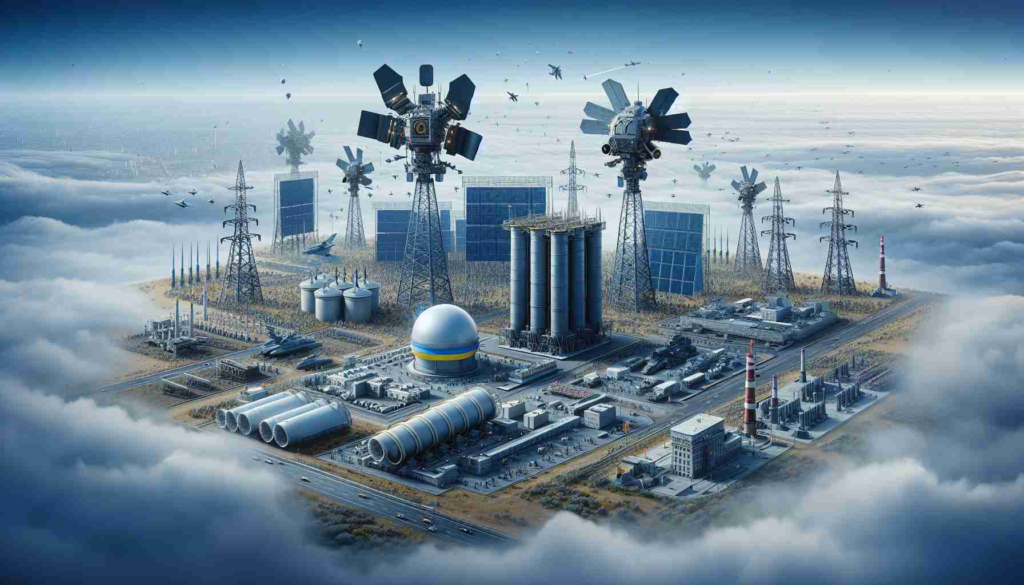
In the wake of repeated missile and drone strikes targeting critical energy infrastructure in Ukraine, Energy Minister German Galushchenko emphasized the need for advanced air defense systems to protect the nation’s energy sector. With winter electricity demands approaching, the minister pointed to the extensive damage caused by such attacks and stressed the difficulties in assessing the full extent due to inaccessible sites buried in rubble. President Volodymyr Zelensky has also appealed to international allies for support in bolstering Ukraine’s air defenses.
The recent offensive by Russia has spotlighted the shortage of air defense systems in Ukraine, especially in areas close to the front line. Zelensky hinted at the nation’s current capabilities and future needs, suggesting the ideal coverage would require numerous units of the Patriot missile system. The impact of the attacks on energy infrastructure could potentially result in billions in damages, with significant destruction to the thermal generating capacity of DTEK, Ukraine’s largest private energy company.
As a measure of resilience, Ukraine plans to introduce energy-saving measures and seeks replacement equipment for the damaged machinery. Despite potential large-scale damage, Galushchenko remains confident that Ukraine can maintain basic power generation to meet between 30% to 50% of its needs.
In light of these events, the focus is on Ukraine’s determination to prevent a repeat of the blackouts experienced in previous years and the importance of robust air defense in ensuring the continuity of the nation’s power supply.
Summary: Ukraine is urgently calling for advanced air defense systems to protect its energy infrastructure from intensified Russian missile and drone strikes. With massive damage to its energy sector and a looming peak in electricity demand, Ukrainian officials have expressed the need to secure the nation’s power grid and maintain essential services.
Impact on the Energy Industry and Market Forecasts
The conflict in Ukraine has profound implications for the energy industry, not only within the country but also globally. The disruption to Ukraine’s energy infrastructure exacerbates the energy security concerns in Europe, which is already experiencing volatility in energy markets as a result of the conflict and sanctions against Russia.
The market forecasts for Ukraine’s energy sector are quite uncertain due to the ongoing hostilities. The risk of supply disruptions, the need for infrastructure repairs, and the potential for long-term investments are all contributing to a highly unpredictable market. If the security situation stabilizes and Ukraine receives the necessary air defense systems to protect its energy infrastructure, the country could begin to recover and rebuild its energy sector, although this may take several years.
In the broader energy market, the conflict in Ukraine has pushed many European countries to expedite the diversification of their energy sources, increasing demand for renewable energy and LNG imports. This shift is likely to result in long-term market trends favoring renewable energy sources and technologies, which could challenge traditional energy companies.
Issues Related to the Energy Industry in Ukraine
The primary issue relates directly to the ongoing conflict and the need for advanced defense systems to safeguard the energy infrastructure. The lack of adequate air defenses exposes critical facilities to continued attacks, risking widespread power outages and humanitarian crises, especially during the harsh winter months.
Additionally, securing replacement equipment and repairing damaged infrastructure present logistical challenges amid the conflict. The international community’s support will be crucial, as Ukraine’s energy sector is deficient in the resources necessary for the quick restoration of its facilities.
Another major concern is the potential for an energy crisis within Ukraine, especially if it cannot meet the population’s power needs. The anticipated shortfall could have a cascading effect, leading to economic hardship and impacting critical services like heating and healthcare.
In response to these challenges, Ukraine and its allies may need to collaborate on strategic energy contingency plans, including the utilization of emergency energy reserves and the temporary introduction of energy rationing measures.
For those interested in learning more about global energy policies and defense systems that could be relevant to Ukraine’s situation, the following resources might be valuable:
– International Energy Agency (IEA): www.iea.org
– NATO’s official website for information on defense systems and alliances: www.nato.int
– The website of European Union’s Energy Sector: ec.europa.eu/energy
It is essential to monitor credible news outlets and official statements for the most current information regarding Ukraine’s energy industry and the international response to their calls for support.

Natalia Toczkowska is a notable figure in digital health technology, recognized for her contributions in advancing telemedicine and healthcare apps. Her work focuses on developing innovative solutions to improve patient care and accessibility through technology. Toczkowska’s research and development in creating user-friendly, secure digital platforms have been instrumental in enhancing the effectiveness of remote medical consultations and patient monitoring. Her dedication to integrating technology in healthcare has not only improved patient outcomes but also streamlined healthcare processes, making her a key influencer in the field of digital health innovation.

